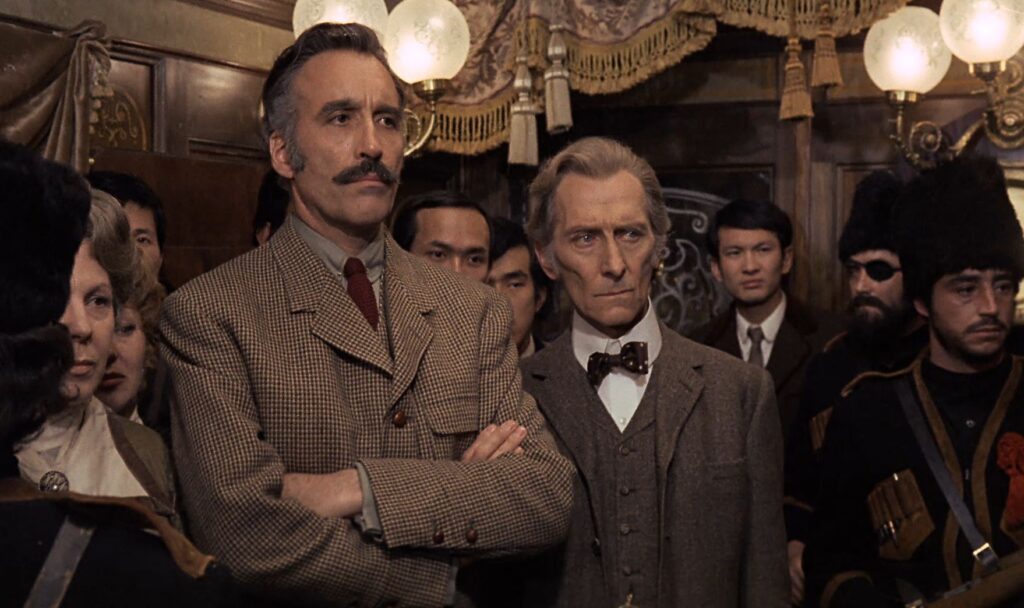
From the moment John Cacavas’ theme can be heard and the title card “Christopher Lee & Peter Cushing in” appears on screen, you know that Horror Express (1972) is going to be something special. This low budget Spanish production has been a cult favorite for decades. Long before the definitive Arrow Video release of 2019 Horror Express received a lot of wide circulation on budget triple feature DVDs. Horror Express is the equivalent of a Hammer production in almost every way except for the fact that the film is a kind of hybrid of genres.
Sometime in the late nineteenth century, Sir Saxton (Christopher Lee) boards the Trans-Siberian Express, with his friend Dr. Wells (Peter Cushing) not far behind, transporting a frozen ape creature. This creature will prove that man is the descendant of the ape if only Sir Saxton can get his specimen back to London in time. Strange incidents keep occurring around his frozen caveman until it miraculously disappears. The passengers, including a Rasputin-esque Holy man named Father Pujardov (Alberto de Mendoza) and a beautiful Countess (Silvia Tortosa), are trapped on the train with an ancient creature who possesses the ability to change its shape and wipe memories clean with its glowing red eyes; extraterrestrial powers unlike anything on earth.
Eugenio Martín, who directed Horror Express and originated its plot, takes the framework of an Agatha Christie novel and imbues it with elements of pulp and horror. Where Christie would have characters turn on each other in paranoid fear as a mystery murderer runs loose Martín has his characters unify in an effort to stop a literal monster. Likewise where Christie would insert a comically inept police officer Martín introduces a crooked, sadistic and all too real policeman in the form of the flamboyant Captain Kazan (Telly Savalas). Martín pinpoints the intersections between the mystery and horror genres adeptly enough that otherwise stale dramatic beats feel fresh and compelling.
The twist that the monster is actually an alien being without any natural corporeal form and the ability to resurrect its victims as zombies highlights the similarities between the popular monster movie and the alien invasion picture. By making the creature otherworldly the potential threat expands and the scale of the film seems to open up. Suddenly survival becomes less important than the annihilation of the alien monster. This revelation comes so near the end of Horror Express that Martín never really gets to explore how the science fiction genre informs and corresponds with other genres, but the gesture itself is intriguing (and likely an influence for Joe Dante who has admitted a great affection for this film).
Since Horror Express is interested in little more than scaring its audience, Eugenio Martín’s formal discourse within the film is executed playfully. Horror Express never intellectualizes these aforementioned concepts; they simply unfold naturally as a part of the narrative. It’s a major part of what is appealing about Horror Express. Unlike so many horror films it is hugely enjoyable while simultaneously allowing for subtle formal complexities.
The talent behind Horror Express is really impressive: Lee and Cushing were living legends of the silver screen when Horror Express was made and Eugenio Martín had a long established reputation for making solid western adventure films in Europe. The producer of Horror Express, the black listed Bernard Gordon, had been writing and producing films while in exile in Europe for almost two decades when he made this film. Of course connoisseurs of the Italian giallo will know Alberto de Mendoza for his work in that genre. Add Telly Savalas (who loves ya baby?) to the mix and Horror Express becomes a sort of who’s who of Euro-cult cinema.
There are a whole slew of films starring Peter Cushing and Christopher Lee that weren’t made at Hammer. As good and beloved as those Hammer pictures are, they’re never as weird or goofy as these other films, including Horror Express. The odd ball qualities of these other movies like Horror Express or The Creeping Flesh (1973) often feature Cushing and Lee playing off of each other in ways that weren’t typical in their work for Hammer. Any fan of these two titans of horror would be well advised to seek out these films because it really is some of their most interesting work.
